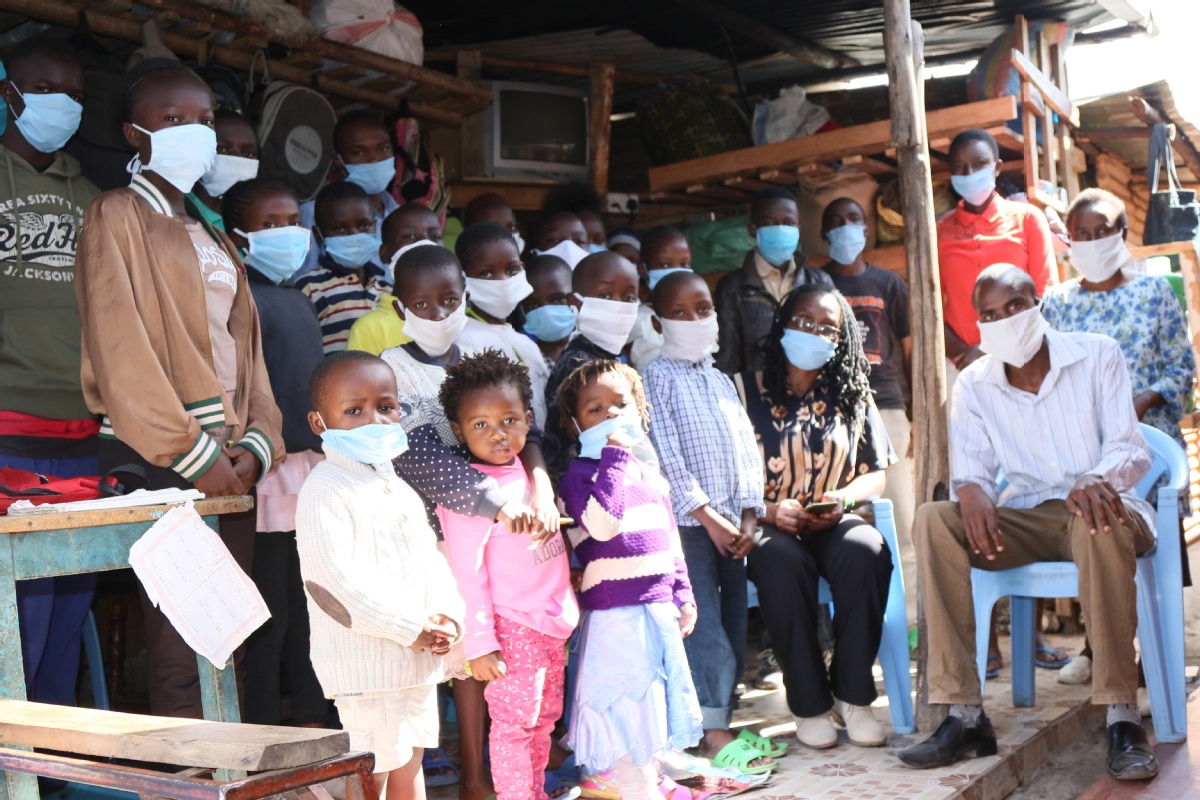
Orphans at Smile Community Center Children's Home pose for a group photo in Nairobi's Kayole Township. (Photo by Otiato Opali: chinadaily.com.cn)
The directive by most African governments to close schools and organizations offering non-essential services has brought to the fore the difficult circumstances under which orphaned children and those that live in children's homes across Africa have to cope with in the wake of the coronavirus pandemic.
According to Margret Nekesa, the founder of Smile Community Center Children's Home located in the Soweto slum of Nairobi's Kayole Township, her establishment has followed all the directives by the government in order to keep children in the institution safe from the coronavirus despite the challenges they face.
"Smile Community Center currently hosts 25 children and since this is where they live, we operate as one big family," Nekesa said. "But unlike other institutions, we mostly host children. That is why we are extra careful to ensure the virus does not come past our gates."
"We have a foot bath at the entrance, where any outsider has to sanitize their shoes in addition to hand sanitizers. We do not allow visitors, except those offering essential services like health workers, but those too are also not allowed to interact with the children and cannot go beyond the administration office," she added.
Nekesa said putting strict measures in place has paid off, since in addition to having no cases of the virus within the facility, the overall health of the children has improved and for the last three months they have not experienced any cases of common flu, upset stomach or diarrhea.
Abel Wanami, a beneficiary of the children's home who is currently pursuing a university degree at the University of Nairobi, said the challenges they face at the institution are numerous, but they have found ways to overcome them and move on.
"I have been brought up in this home since I joined high school, and when schools were closed because of the virus I had no option but to come back. One of our main challenges is the fact some of my brothers and sisters in this home are very young and cannot observe some of the social distancing rules unless prompted," Wanami said.
"In addition, since we are still struggling with facilities, some of us have to share amenities like beds, in which case there is no social distancing. That is why our management has insisted no one from outside can have contact with the rest of us in order to ensure we keep the virus out," Wanami added.
According to Wanami, they have been surviving on donations from well-wishers. He hopes the government can come up with a structured way of identifying needy children and ensuring they can get aid for school fees, clothing and food even beyond the coronavirus pandemic.
"A week ago we received some food donations from the Nairobi District Children's Office and we are grateful. However, that is the only food donation we have received from the government in addition to a donation from the Nairobi County Woman Member of Parliament. We managed to get the government donation because we file monthly returns with the children's office," Nekesa said.
Nekesa added the children's home mostly relies on well-wishers for food donations which has been the greatest challenge they have faced during the pandemic
"Since the government has restricted movement into children's homes, most of our donors cannot come over to visit and make donations. However, we have managed to stay in touch with our donors through online platforms like our website and Facebook page as well as through WhatsApp," Nekesa said.
She added the masks they use are made by the orphans living in the children's home. Nekesa's main worry going forward is how the government will ensure hygiene and social distancing once schools reopen.
"I handle children from as young as 4 years old and I know firsthand that maintaining social distance in this age group is a challenge," she said.
"In addition, most schools in the slum are privately owned and since they have not been making any money in the past three months, we are worried they might close due to lack of funds to pay teachers or rent for their institutions, leaving our children with nowhere to study since there are no government schools in this area," Nekesa added.


